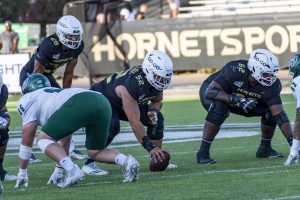Photo Slideshow: ‘President’s Concert’ not just for Gonzalez
April 26, 2007
var uslide_show_id = “af33fed2-3273-4560-9de4-e9d855adc468”;var slideshowwidth = “468”;var linktext = “Click here to open the slideshow.“;
One of the highlights of the weeklong 15th annual Festival of the Arts that showcased the full array of Sacramento State’s theatrical, artistic and musical prowess was the “President’s Concert” by the Sun String Quartet.
Honoree President Gonzalez, who attended the concert, said, “It’s very, very touching that they’re dedicating [the program] to a [Sac State] alumni.”
Annette Brodovsky, the aluma whom the concert was dedicated to, was a trained violinist who instructed high school ensembles and taught music in her home. Brodovsky was killed by a suspected drunk driver on April 3.
The quartet features Sac State faculty string teachers, including Anna Presler and Ian Swensen on violin, Anna Kruger, violist, and Andrew Luchansky, cellist, who were joined by Natsuki Fukasawa on piano for the Brahm’s Quintet in F minor.
The quartet began the concert appropriately with the Elegy for String Quartet by modern composer Elliot Carter, in remembrance of Annette Brodovsky.
Next on the program was Haydn’s “Emperor” Quartet in C Major, which Presler describes as possessing “humor, delight and drama within an elegant symmetrical form.”
The grand finale of the second half of the program was Brahms’ monumental Quintet in F minor, a piece that is so long at 50 minutes that Luchansky comments it feels like a “symphony for quintet” and is “one of the most profound, emotional pieces in the musical repertory”.
Founded by Presler and Luchansky in 1994 with Swensen and Kruger joining in 2002, the Sun Quartet has become a close-knit group with a “wealth of experience coming from a real camaraderie and closeness”, says Luchansky. Compared to an orchestra, he adds that “it’s much more demanding but much more rewarding. It’s the pinnacle of music that gives you the most back”.
Presler echoes this enthusiasm for the quartet/chamber music. “The exquisite repertoire, the interpretive freedom enjoyed by the players, and the deep friendships formed in the process of rehearsing and performing all drew me to chamber music and continue to hold me fast,” she said. “Orchestral playing can be a lot of fun but in chamber music the possibilities of rhythmic flexibility and variety and specificity of sound colors and articulations are much greater.”
Vincent Beiderbecke can be reached at [email protected]























































































































